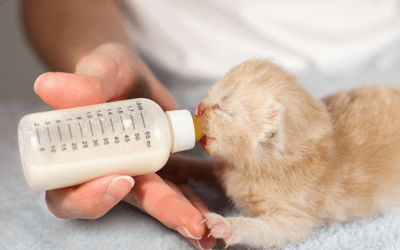A Comprehensive Guide to Caring for a Baby Kitten
Bringing a baby kitten into your home is an incredibly rewarding experience, but it also comes with a significant responsibility. These tiny creatures require specialized care and attention to ensure their health and well-being. This comprehensive guide will provide you with all the essential information you need to know about caring for a baby kitten, from feeding and grooming to socialization and veterinary care.
Feeding
The most important aspect of caring for a baby kitten is ensuring they receive proper nutrition. Kittens under the age of eight weeks should be fed kitten milk replacer (KMR) every two to three hours. KMR is specially formulated to provide kittens with the nutrients they need for growth and development.
To feed a baby kitten, follow these steps:
- Warm the KMR to body temperature (95-100°F).
- Hold the kitten upright and support its head.
- Gently insert the bottle nipple into the kitten’s mouth.
- Allow the kitten to suckle until it is full.
- Burp the kitten by gently patting its back.
As the kitten grows, you can gradually transition it to solid food. Start by mixing a small amount of kitten food with KMR and gradually increase the amount of food until the kitten is fully weaned.
Grooming
Baby kittens require regular grooming to keep their fur clean and free of mats. Use a soft brush or comb to gently remove any loose hair or debris. Avoid bathing the kitten until it is at least eight weeks old.
To bathe a kitten, follow these steps:
- Fill a sink or tub with warm water.
- Wet the kitten’s fur thoroughly.
- Apply a small amount of kitten shampoo and gently massage it into the fur.
- Rinse the kitten’s fur thoroughly.
- Wrap the kitten in a towel and gently pat it dry.
Socialization
Socialization is crucial for the development of a well-rounded and friendly kitten. Expose your kitten to a variety of people, places, and experiences from a young age. This will help them learn to trust humans and adapt to different environments.
To socialize your kitten, follow these tips:
- Handle the kitten regularly and gently.
- Introduce the kitten to new people and places in a positive and non-threatening manner.
- Play with the kitten using interactive toys.
- Consider enrolling the kitten in a kitten socialization class.
Veterinary Care
Regular veterinary care is essential for maintaining your kitten’s health. Schedule an appointment with your veterinarian as soon as possible after bringing the kitten home. Your veterinarian will perform a physical exam, administer vaccinations, and provide you with guidance on feeding, grooming, and socialization.
Your kitten will need to receive regular vaccinations to protect it from common diseases such as feline distemper, feline leukemia, and rabies. Your veterinarian will determine the appropriate vaccination schedule for your kitten based on its age and lifestyle.
Common Health Issues
Baby kittens are susceptible to a variety of health issues, including:
- Diarrhea: Diarrhea can be caused by a variety of factors, including dietary changes, infections, and parasites. If your kitten has diarrhea, it is important to take it to the veterinarian for diagnosis and treatment.
- Respiratory infections: Respiratory infections are common in kittens and can be caused by viruses, bacteria, or fungi. Symptoms of a respiratory infection include sneezing, coughing, and difficulty breathing. If your kitten is showing signs of a respiratory infection, it is important to take it to the veterinarian for treatment.
- Eye infections: Eye infections are also common in kittens and can be caused by bacteria, viruses, or allergies. Symptoms of an eye infection include redness, swelling, and discharge. If your kitten is showing signs of an eye infection, it is important to take it to the veterinarian for treatment.
- Parasites: Kittens can be infected with a variety of parasites, including fleas, ticks, and worms. Parasites can cause a variety of health problems, including anemia, weight loss, and skin irritation. It is important to treat your kitten for parasites regularly to prevent these problems.
Conclusion
Caring for a baby kitten is a rewarding and challenging experience. By following the tips outlined in this guide, you can provide your kitten with the best possible care and help it grow into a healthy and happy adult cat. Remember to be patient, attentive, and loving, and your kitten will thrive under your care.

